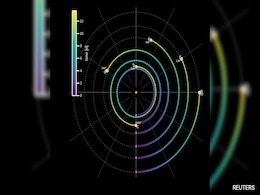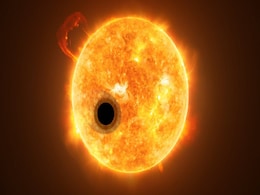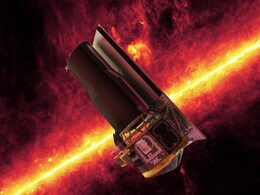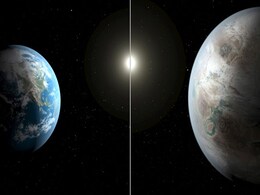Solar System And Their Planets
- All
- News
-

Ancient Black Holes Might Be Passing Through Our Solar System Frequently, Study Claims
- Wednesday September 18, 2024
- Written by Gadgets 360 Staff
Primordial black holes, which may have formed shortly after the Big Bang, could pass through the solar system once per decade. These black holes are much lighter and smaller than typical black holes, yet their gravitational effects may help scientists uncover the mystery of dark matter. Detecting gravitational disruptions from these flybys might be...
-
 www.gadgets360.com
www.gadgets360.com
-

6 Planets Found In Synchronized Orbit May Help Solve Cosmic Puzzle
- Wednesday November 29, 2023
- World News | Reuters
They are the most common type of planet observed in our Milky Way galaxy - two to three times the diameter of Earth but smaller than Neptune, and orbiting closer to their stars than our solar system's innermost planet Mercury does to the sun.
-
 www.ndtv.com
www.ndtv.com
-

Scientists Study Shrinking Mini-Neptunes to Understand Planetary Evolution
- Friday August 5, 2022
- Edited by Gadgets 360 Newsdesk
Scientists at Caltech have discovered four exoplanets — TOI 560b, TOI 1430.01, TOI 1683.01, and TOI 2076b – that appear to be shrinking in size and losing their atmosphere gradually. The rate at which this change is taking place suggests that these celestial bodies, called mini-Neptunes, will eventually lose their atmosphere completely to becom...
-
 www.gadgets360.com
www.gadgets360.com
-

NASA Shows Giant Debris Cloud Formed by Collision of Celestial Bodies
- Monday March 21, 2022
- Edited by Gadgets 360 Newsdesk
Most rocky planets and satellites, including our Earth and the Moon, are formed or shaped by massive collisions among celestial bodies early in the solar system. When these objects smash together, they could either accumulate more material and increase their size or they can break apart into multiple smaller bodies.
-
 www.gadgets360.com
www.gadgets360.com
-

New Distant Object With Orbit Found During Hunt For Planet X
- Sunday October 7, 2018
- Science | Indo-Asian News Service
In their search for unknown dwarf planets and Planet X and for distant Solar System objects, a team of scientists have discovered a new extremely distant object far beyond Pluto with an orbit.
-
 www.ndtv.com
www.ndtv.com
-

Google Maps Now Lets You Explore Many Planets and Moons of Our Solar System
- Wednesday October 18, 2017
- Indo-Asian News Service
"We've added Pluto, Venus, and several other moons for a total of 12 new worlds for you to explore," Marquardt added.
-
 www.gadgets360.com
www.gadgets360.com
-

This Mysterious 'Hot Jupiter' Is On A Wild Orbital Ride
- Wednesday March 30, 2016
- World News | Rachel Feltman, The Washington Post
Hot Jupiters are exactly what they sound like. But it's how these Jupiter-like gas giants get so hot that's interesting: The planets orbit super-close to their host stars, creating incredibly hot worlds that undergo a whole slew of intriguing chemical reactions. Our Jupiter may be distant and cool by comparison, but in other solar systems, scientis...
-
 www.ndtv.com
www.ndtv.com
-

Five New 'Hot Jupiters' Discovered
- Thursday February 18, 2016
- World News | Press Trust of India
Scientists have discovered five new Jupiter-like planets that are similar in characteristics to our solar system's biggest planet and orbit very close to their host stars.
-
 www.ndtv.com
www.ndtv.com
-

Astronomers Photograph a Baby Jupiter in Another Solar System
- Friday August 14, 2015
- World News | Reuters
Astronomers have taken a photograph of a baby planet beyond the solar system that may reveal clues as to how planets such as Jupiter are formed and influence their planetary siblings, a study released on Thursday shows.
-
 www.ndtv.com
www.ndtv.com
-

Ancient Black Holes Might Be Passing Through Our Solar System Frequently, Study Claims
- Wednesday September 18, 2024
- Written by Gadgets 360 Staff
Primordial black holes, which may have formed shortly after the Big Bang, could pass through the solar system once per decade. These black holes are much lighter and smaller than typical black holes, yet their gravitational effects may help scientists uncover the mystery of dark matter. Detecting gravitational disruptions from these flybys might be...
-
 www.gadgets360.com
www.gadgets360.com
-

6 Planets Found In Synchronized Orbit May Help Solve Cosmic Puzzle
- Wednesday November 29, 2023
- World News | Reuters
They are the most common type of planet observed in our Milky Way galaxy - two to three times the diameter of Earth but smaller than Neptune, and orbiting closer to their stars than our solar system's innermost planet Mercury does to the sun.
-
 www.ndtv.com
www.ndtv.com
-

Scientists Study Shrinking Mini-Neptunes to Understand Planetary Evolution
- Friday August 5, 2022
- Edited by Gadgets 360 Newsdesk
Scientists at Caltech have discovered four exoplanets — TOI 560b, TOI 1430.01, TOI 1683.01, and TOI 2076b – that appear to be shrinking in size and losing their atmosphere gradually. The rate at which this change is taking place suggests that these celestial bodies, called mini-Neptunes, will eventually lose their atmosphere completely to becom...
-
 www.gadgets360.com
www.gadgets360.com
-

NASA Shows Giant Debris Cloud Formed by Collision of Celestial Bodies
- Monday March 21, 2022
- Edited by Gadgets 360 Newsdesk
Most rocky planets and satellites, including our Earth and the Moon, are formed or shaped by massive collisions among celestial bodies early in the solar system. When these objects smash together, they could either accumulate more material and increase their size or they can break apart into multiple smaller bodies.
-
 www.gadgets360.com
www.gadgets360.com
-

New Distant Object With Orbit Found During Hunt For Planet X
- Sunday October 7, 2018
- Science | Indo-Asian News Service
In their search for unknown dwarf planets and Planet X and for distant Solar System objects, a team of scientists have discovered a new extremely distant object far beyond Pluto with an orbit.
-
 www.ndtv.com
www.ndtv.com
-

Google Maps Now Lets You Explore Many Planets and Moons of Our Solar System
- Wednesday October 18, 2017
- Indo-Asian News Service
"We've added Pluto, Venus, and several other moons for a total of 12 new worlds for you to explore," Marquardt added.
-
 www.gadgets360.com
www.gadgets360.com
-

This Mysterious 'Hot Jupiter' Is On A Wild Orbital Ride
- Wednesday March 30, 2016
- World News | Rachel Feltman, The Washington Post
Hot Jupiters are exactly what they sound like. But it's how these Jupiter-like gas giants get so hot that's interesting: The planets orbit super-close to their host stars, creating incredibly hot worlds that undergo a whole slew of intriguing chemical reactions. Our Jupiter may be distant and cool by comparison, but in other solar systems, scientis...
-
 www.ndtv.com
www.ndtv.com
-

Five New 'Hot Jupiters' Discovered
- Thursday February 18, 2016
- World News | Press Trust of India
Scientists have discovered five new Jupiter-like planets that are similar in characteristics to our solar system's biggest planet and orbit very close to their host stars.
-
 www.ndtv.com
www.ndtv.com
-

Astronomers Photograph a Baby Jupiter in Another Solar System
- Friday August 14, 2015
- World News | Reuters
Astronomers have taken a photograph of a baby planet beyond the solar system that may reveal clues as to how planets such as Jupiter are formed and influence their planetary siblings, a study released on Thursday shows.
-
 www.ndtv.com
www.ndtv.com










